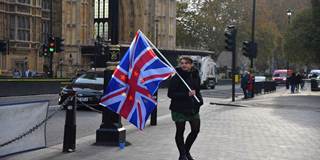British Prime Minister Theresa May is now confronting Parliament with a vexing choice between an unsatisfying Brexit deal and crashing out of the European Union. But, because no compromise with the EU is acceptable to hard-line Brexiteers, the argument that another referendum would be divisive is beside the point.
LONDON – British members of Parliament will soon have to make one of the most difficult political decisions of their lives. The choice is between approving the Brexit deal that Prime Minister Theresa May has negotiated with the European Union, crashing out of the EU with no deal, or trying to reverse the exit process altogether. With respect to the third option, it has been two and a half years since a slim majority of Britons voted to leave the EU, and recent polls now find that a majority would prefer to remain.

LONDON – British members of Parliament will soon have to make one of the most difficult political decisions of their lives. The choice is between approving the Brexit deal that Prime Minister Theresa May has negotiated with the European Union, crashing out of the EU with no deal, or trying to reverse the exit process altogether. With respect to the third option, it has been two and a half years since a slim majority of Britons voted to leave the EU, and recent polls now find that a majority would prefer to remain.